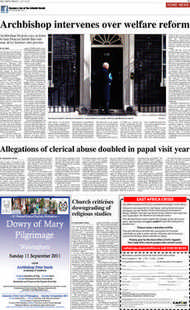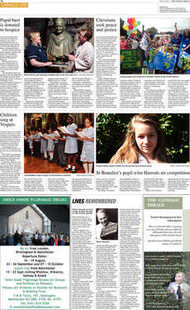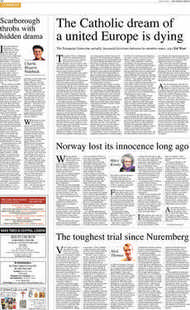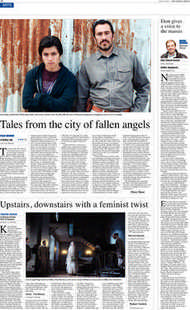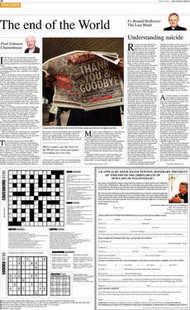Page 3, 29th July 2011
Page 3

Report an error
Noticed an error on this page?If you've noticed an error in this article please click here to report it.
Tags
Share
Related articles
Only A Huge National Drive Can Save England’s Youth
Archbishop Says Poor Are Biggest Victims Of Cuts
Bishops Turn Up Heat On Cameron Over Gay Marriage
Church Denies Rift Over Support For Big Society
Children In Lurch Over Benefit Threat
Archbishop Of Westminster Congratulates Belgian Primate
Archbishop intervenes over welfare reform
Archbishop Nichols says in letter to Iain Duncan Smith that cuts may drive families into poverty
BY ED WEST
THE ARCHBISHOP of Westminster has expressed his concern that Government policy will drive thousands of poor families into poverty.
In a letter to Work and Pensions Minister Iain Duncan Smith, Archbishop Vincent Nichols said he was concerned about the potential impact of new and planned Government welfare policies on the most vulnerable members of society.
The Government is imposing new limits of £400 a week for a four-bedroom home, £340 for a threebedroom home, £290 for a two-bedroom home and £250 for a one-bedroom home. In the strongly worded letter Archbishop Nichols referred to the department’s own figures which showed that 50,000 families are losing £93 a week as a result of the welfare reforms.
The archbishop wrote that this would be “a significant sum for those struggling financially”, and said: “I recognise the difficulties which must arise in seeking to promote fairness between those in work and those of working age receiving benefits but our own agencies working with poor families are becoming increasingly concerned with how the detail of how the changes will affect those families.
“As you know, some estimates that have already appeared in the media suggest 40,000 families may be rendered homeless. If this were indeed the case it would surely be a perverse result of policies aimed at reducing dependency of the ‘benefits culture’ since emergency support would immediately need to be put in place.” Archbishop Nichols also referred to reports from the Caritas Social Action Network (CSAN) regarding growing concerns at the repercussions of the changes and the effect they are having on existing social problems.
The archbishop quotes the Depaul Trust, a member of CSAN, reporting homelessness increasing for the first time in 10 years and youth homelessness rising by 15 per cent in the last 12 months.
“In some areas of my own Diocese of Westminster, it is being suggested that one in six children may have to move home (and probably move school), while in Maida Vale the effects may force up to 43 per cent of households to move. We fear that the cost of this may be felt most by vulnerable families, whose support networks may rapidly disappear in the process,” wrote Archbishop Nichols.
The archbishop added: “It would be very helpful to have your assurance that steps are available and being taken to ensure that the vulnerable and marginalised in our society will not be disproportionately harmed by the new welfare policies. It seems that a further look at the impact on individuals, in particular those already struggling, is needed to fully determine the effect of the changes on both people and communities.” In response Lord Freud, Minister for Welfare Reform, wrote to the archbishop, saying: “The Coalition Government is committed to reforming the welfare system to make it farer, more affordable and to tackle poverty and welfare dependency. In a situation where tough choices are inevitable, we need to be fair to both benefit recipients and the taxpayer. We believe that there have to be some limits on the overall levels of benefit it is reasonable for the state to provide. This is behind our decision to introduce a cap on the level of benefits a workless household can receive.” He said that with a limit of £35,000 per annum per family “households will still be able to receive significant amounts of financial assistance from state welfare payments. In terms of housing, the introduction of the benefit cap will mean that workless households will have to make the same decisions with regard to location s families in work.” He also pointed out that the Government is implementing “the biggest single welfare-to-work programme this country has ever seen”, that once someone begins working they are no longer subject to the benefit cap, and that the Government published an impact assessment of the benefit cap which said the increase in homelessness could not be estimated.
“We take the issue of homelessness very seriously,” he said. “The aim of the benefit cap is to achieve longterm positive behavioural effects through changed attitudes to welfare, responsible life choices and strong work incentives. We believe someone in work should always be better off than someone on benefits. This is at the heart of the welfare reform.” Mick Clarke, chief executive of the homeless charity the Passage, said that although he welcomed “the Government's engagement on many issues affecting homelessness”, he had “huge concerns that there are still many thousands of 25to 34year-olds facing a significant cut in housing benefit which could also then leave them facing homelessness because of the lack of shared accommodation.” He added: “If the Government can recognise that shared accommodation is not appropriate for many formerly homeless people, it is a mystery as to why they cannot see that this should also apply for other vulnerable people such as those with disabilities, mental health issues, and those fleeing domestic violence. I therefore welcome the archbishop's intervention and very much hope the Minister takes up the offer of further dialogue to ensure those most vulnerable in our society are protected.”
blog comments powered by Disqus




